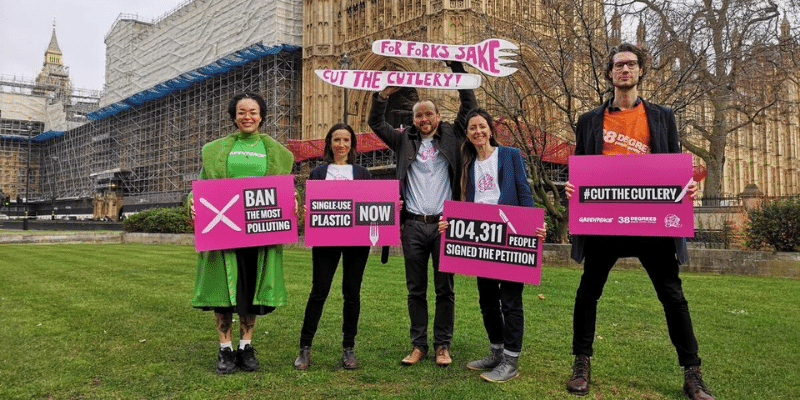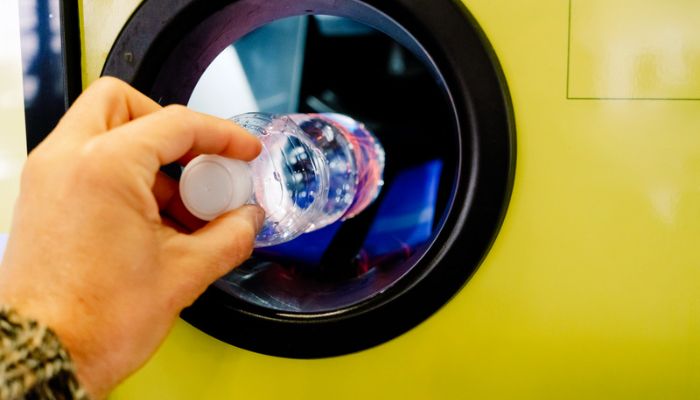Single-use plastic ban FINALLY comes into force
With a ban on some of the most polluting single-use plastics due to come in on the 1st October, City to Sea’s Policy Manager looks at how we reached this ban and what it will mean going forward.
The final straw
Way back in October 2020 Westminster banned the few single-use plastic items including straws, coffee stirrers and cotton bud sticks. This was in part because the EU, through the Single-Use Plastic Directive, had mandated that these be banned by June 2021. Westminster only included in their ban straws, coffee stirrers and cotton bud sticks and not all the other items outlined in the EU Directive – like single-use plastic cutlery. This means, when the Single-use plastic Directive came into force in the summer of 2021 in countries all across Europe would be banning items that we were not.
So, in 2022 we launched a campaign calling on Westminster to ‘cut the cutlery’ and ban the remaining items including; single-use cutlery, takeaway plates, and particular polystyrene containers, bringing England in line with the rest of Europe.

Petition win!
More than 118,000 people signed our petition, which we launched in collaboration with 38 Degrees and Greenpeace, forcing the government to open a consultation on completing the ban. An incredible 50,000 of our supporters then went on to respond to the Defra consultation. This was a huge campaign win and played a part in the ban finally coming into force from the 1st October 2023. However, while the government proclaims these bans as “major steps” towards curbing plastic pollution, anticipating “a huge impact,” we must ask, are these really ‘world leading’ as they claim?
Firstly, this ban was hard won and very slow to come into place. The October 2023 ban comes more than 2 years after it was mandated to be in place across all the EU and 4 years after these measures were agreed by all European institutions. Significantly, it drags behind the speed in which our neighbours in Scotland have moved and is less ambitious than the proposed ban in Wales that will include items like single-use plastic bags (in England we still use over 400 million of these a year).

But what does it really mean?
So, while it’s great news that less single-use plastic should be ending up in our ocean as a result of the ban, the reality is that loads of plastic still is. And in fact, this amount is getting bigger, rather than smaller. So, although plastic cutlery is one of the top 15 littered items (according to our friends at Keep Britain Tidy), it makes up just 0.4% of all littered items, and even less by volume (even though the ban represents a mind-blowing 4.25 BILLION pieces of single-use cutlery saved in England each year!). The main culprits are found in other plastics like, for example, single-use plastic bottles – with smaller bottles contributing to almost a quarter of litter. Carrying reusable bottles and using the Refill app to refill-on-the-go, is a great way to tackle this problem, but we really need government legislation to truly tackle the problem.

Real solutions
For this there are real political solutions. Like a Deposit Return Scheme (DRS) that in the UK still hangs in the balance after this government has announced ANOTHER delay until October 2025 (this was promised back in 2018!). But it’s not just about bottles, or forks, or cotton buds. These are just some of many single-use items that symbolise our throwaway culture but we’re not going to sort this problem out by banning one item at a time. We need a total shift away from single-use towards reuse.
That’s why we really need overarching reuse targets and why we’re calling for 30% of all packaging to be reused by 2030. So, if you hear government claiming to be ‘world leaders’ in tackling plastic pollution over the coming months, remember that they’ve just taken the first baby steps on a much longer journey to tackle plastic pollution. And until they start moving at the pace the plastic crisis demands, we all need to get behind the Refill Revolution. Now that’s a solution that has legs.
You may unsubscribe at any time. Check out our Privacy Policy for more information on how we store and protect your data.

